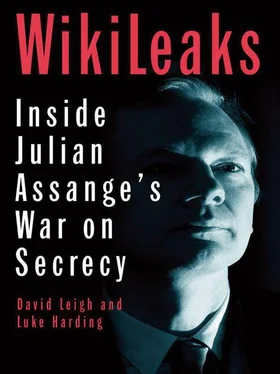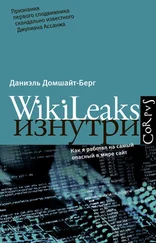Harding, Luke - WikiLeaks - Inside Julian Assange's War on Secrecy
Здесь есть возможность читать онлайн «Harding, Luke - WikiLeaks - Inside Julian Assange's War on Secrecy» весь текст электронной книги совершенно бесплатно (целиком полную версию без сокращений). В некоторых случаях можно слушать аудио, скачать через торрент в формате fb2 и присутствует краткое содержание. Жанр: Старинная литература, на английском языке. Описание произведения, (предисловие) а так же отзывы посетителей доступны на портале библиотеки ЛибКат.
- Название:WikiLeaks: Inside Julian Assange's War on Secrecy
- Автор:
- Жанр:
- Год:неизвестен
- ISBN:нет данных
- Рейтинг книги:3 / 5. Голосов: 1
-
Избранное:Добавить в избранное
- Отзывы:
-
Ваша оценка:
- 60
- 1
- 2
- 3
- 4
- 5
WikiLeaks: Inside Julian Assange's War on Secrecy: краткое содержание, описание и аннотация
Предлагаем к чтению аннотацию, описание, краткое содержание или предисловие (зависит от того, что написал сам автор книги «WikiLeaks: Inside Julian Assange's War on Secrecy»). Если вы не нашли необходимую информацию о книге — напишите в комментариях, мы постараемся отыскать её.
WikiLeaks: Inside Julian Assange's War on Secrecy — читать онлайн бесплатно полную книгу (весь текст) целиком
Ниже представлен текст книги, разбитый по страницам. Система сохранения места последней прочитанной страницы, позволяет с удобством читать онлайн бесплатно книгу «WikiLeaks: Inside Julian Assange's War on Secrecy», без необходимости каждый раз заново искать на чём Вы остановились. Поставьте закладку, и сможете в любой момент перейти на страницу, на которой закончили чтение.
Интервал:
Закладка:
The “national human intelligence collection directive” was distributed to US missions at the UN in New York, Vienna and Rome; and to 33 embassies and consulates, including those in London, Paris and Moscow. All of Washington’s main intelligence agencies – the CIA’s clandestine service, the US Secret Service and the FBI – as well as the state department, were circulated with these “reporting and collection needs”.
The UN has long been the victim of bugging and espionage operations. Veteran diplomats are used to conducting their most sensitive discussions outside its walls, and not everyone was surprised at the disclosures. Robert Baer, a former CIA field officer in the Middle East, remarked: “There is a reason the CIA station is usually next door to the political section in our embassies. There are ambassadors who love that stuff. In the American system it sloshes over from side to side.”
But the cable – signed “CLINTON” – illuminated a cynical spying campaign. American diplomatic staff enjoy immunity and can operate without suspicion. The British historian and Guardian columnist Timothy Garton Ash was one of many disturbed by the directive. Garton Ash remarked that “regular American diplomats are being asked to do stuff you would normally expect of low-level spooks”.
Experts on international law were also affronted. The cable seemed to show the US breaching three of the founding treaties of the UN. Ban’s spokesman, Farhan Haq, sent off a letter reminding member states to respect the UN’s inviolability: “The UN charter, the headquarters agreement and the 1946 convention contain provisions relating to the privileges and immunities of the organisation. The UN relies on the adherence by member states to these various undertakings.”
The American cables held numerous other secrets that it was right to disclose in the public interest. Memo after memo from US stations across the Middle East exposed widespread behind-the-scenes pressures to contain President Ahmadinejad’s Iran, which the US, Arab states and Israel believed to be close to acquiring nuclear weapons. Startlingly, the cables showed King Abdullah of Saudi Arabia urging the United States to attack Iran to destroy its nuclear programme. Other Arab allies, too, had secretly been agitating for military action against Tehran. Bombing Iranian nuclear facilities had hitherto been publicly viewed as a desperate last resort that could ignite a far wider war – one that was not seriously on anyone’s diplomatic table except possibly that of the Israelis.
The Saudi king was recorded as having “frequently exhorted the US to attack Iran to put an end to its nuclear weapons programme”. He “told you [Americans] to cut off the head of the snake”, the Saudi ambassador to Washington, Adel al-Jubeir, said, according to a report on Abdullah’s meeting with the US general David Petraeus in April 2008.
The cables further highlighted Israel’s anxiety to preserve its regional nuclear monopoly, its readiness to go it alone against Iran – and its relentless attempts to influence American policy. The defence minister, Ehud Barak, claimed, for example, in June 2009, that there was a window of “between six and 18 months from now in which stopping Iran from acquiring nuclear weapons might still be viable”. Thereafter, Barak said, “any military solution would result in unacceptable collateral damage”.
The true scale also emerged of America’s covert military involvement in Yemen, the Arab world’s poorest nation. Washington’s concern that Yemen has become a haven for Al-Qaida in the Arabian Peninsula (Aqap) was understandable. The group had carried out a series of attacks on western targets, including a failed airline cargo bomb plot in October 2010 and an attempt the previous year to bring down a US passenger jet over Detroit. Less justifiable, perhaps, was why the US agreed to a secret deal with Yemen’s president, Ali Abdullah Saleh, to pass off US attacks on al-Qaida targets as his own.
The cables showed Saleh gave the Americans an “open door” to conduct counter-terrorist missions in Yemen, and to launch cruise missile strikes on Yemeni territory. The first in December 2009 killed dozens of civilians along with alleged militants. Saleh presented it as Yemen’s own work, supported by US intelligence. In a meeting with Gen Petraeus, the head of US central command, Saleh admitted lying to his population about the strikes, and deceiving parliament. “We’ll continue saying the bombs are ours and not yours,” he told Petraeus. It was a lie the US seemed ready to condone.
As the New York Times ’s Bill Keller put it, the documents advanced our knowledge of the world not in great leaps but by small degrees. For those interested in foreign policy, they provided nuance, texture and drama. For those who followed stories less closely, they were able to learn more about international affairs in a lively way. But the cables also included a few jaw-dropping moments, when an entire curtain seemed swept aside to reveal what a country is really like.
The most dramatic such disclosures came not from the Middle East but Russia. It is widely known that Russia – nominally under the control of President Dmitry Medvedev but in reality run by the prime minister, Vladimir Putin – is corrupt and undemocratic. But the cables went much further. They painted a bleak and despairing picture of a kleptocracy centred on Putin’s leadership, in which officials, oligarchs and organised crime are bound together in a “virtual mafia state”.
Arms trafficking, money laundering, personal enrichment, protection for gangsters, extortion and kickbacks, suitcases full of money and secret offshore accounts – the American embassy cables unpicked a political system in which bribery totals an estimated $300bn year, and in which it is often hard to distinguish between the activities of government and organised crime. Read together, the collection of cables offered a rare moment of truth-telling about a regime normally accorded international respectability.
Despite the improvement in US-Russian relations since President Obama took power, the Americans are under no illusions about their Russian interlocutors. The cables stated that Russian spies use senior mafia bosses to carry out criminal operations such as arms trafficking. Law enforcement agencies, meanwhile, such as the police, spy agencies and the prosecutor’s office, run a de facto protection racket for criminal networks. Moscow’s former mayor, Yuri Luzhkov, sacked in 2010 by Medvedev for political reasons, presided over a “pyramid of corruption”, US officials suggested. (Luzkov’s billionaire wife, Yelena Baturina, dismissed the accusations as “total rubbish”.)
Russia’s bureaucracy is so corrupt that it operates what is in effect a parallel tax system for the private enrichment of police, officials, and the KGB’s successor, the federal security service (FSB), the cables said. There have been rumours for years that Putin has personally amassed a secret fortune, hidden overseas. The cables made clear that US diplomats treat the rumours as true: they speculate that Putin deliberately picked a weak successor when he stepped down as Russian president in 2008 because he could be worried about losing his “illicit proceeds” to law enforcement investigations. In Rome, meanwhile, US diplomats relayed suspicions that the Italian prime minister, Silvio Berlusconi, could be “profiting personally and handsomely” by taking a cut from clandestine energy deals with Putin.
A particularly damning cable about Russia was sent from Madrid. Dated 8 February 2010, it fed back to Washington a briefing by a Spanish prosecutor. Jose Gonzalez spent more than a decade trying to unravel the activities of Russian organised crime in Spain. He met US officials in January and told them that Russia had become a “virtual mafia state” in which “one cannot differentiate between the activities of the government and OC [organised crime] groups.” Gonzalez said he had evidence – thousands of wiretaps have been used in the last 10 years – that certain political parties in Russia worked hand in hand with mafia gangs. He said that intelligence officers orchestrated gun shipments to Kurdish groups to destabilise Turkey and were pulling the strings behind the 2009 case of the Arctic Sea cargo ship suspected of carrying missiles destined for Iran. Gangsters enjoyed support and protection and, in effect, worked “as a complement to state structures”, he told US officials.
Читать дальшеИнтервал:
Закладка:
Похожие книги на «WikiLeaks: Inside Julian Assange's War on Secrecy»
Представляем Вашему вниманию похожие книги на «WikiLeaks: Inside Julian Assange's War on Secrecy» списком для выбора. Мы отобрали схожую по названию и смыслу литературу в надежде предоставить читателям больше вариантов отыскать новые, интересные, ещё непрочитанные произведения.
Обсуждение, отзывы о книге «WikiLeaks: Inside Julian Assange's War on Secrecy» и просто собственные мнения читателей. Оставьте ваши комментарии, напишите, что Вы думаете о произведении, его смысле или главных героях. Укажите что конкретно понравилось, а что нет, и почему Вы так считаете.












